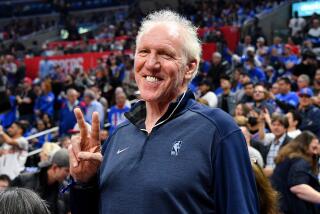Making History, Again
- Share via
Kareem Abdul-Jabbar casts a long shadow. As a 7-foot-2-inch center with UCLA, Abdul-Jabbar (then Lew Alcindor) led Coach John Wooden’s Bruins to three national titles from 1967-69. He converted to Islam, changing his name in 1971. As a pro, he helped the Milwaukee Bucks capture the NBA championship in 1971 before leading the Los Angeles Lakers to five NBA titles and garnering six MVP trophies. And that was before he hit his stride as a Renaissance man. In addition to being a jazz connoisseur, Abdul-Jabbar is the author of several best-selling books. For his latest tome, “Brothers In Arms: The Epic Story of the 761st Tank Battalion, WWII’s Forgotten Heroes” (Broadway Books), Abdul-Jabbar co-authored with Anthony Walton a history of the African American tank battalion. Initially given combat training only for show, the 761st was eventually deployed to the beleagured Allied front in 1944, where it performed heroically, aiding in the liberation of towns and concentration camps. We spoke with the author about the rewards of life off the court.
The irony of coming home to segregation after liberating Nazi concentration camps has been listed as one of the inspirations for the civil rights movement.
It took something like that to make white Americans think about it. There were signs in Berlin that said “No Jews,” and signs in Birmingham, Alabama, that said “White Only.” A number of [members of the 761st] had been from the South and had witnessed a lynching or something bad, and it resonated with the stuff that they saw in the death camps.
Long-overdue recognition of the 761st began in 1978 with the Presidential Unit Citation for Extraordinary Heroism awarded by President Jimmy Carter. What could you add to the record?
I think people will understand that the black community of America did an extraordinary job at great risk. The Tuskegee Airmen and the 761st did extraordinary things. That doesn’t include all the menial stuff that they did ungrudgingly.
Did you experience segregation?
My experience started in the spring of 1962. I had to go down to North Carolina to a family friend’s graduation. I had to ride the bus there. It was horrifying. I thought I was traveling in another country. As soon as we got across the bridge from Washington, D.C., I started to see all the signs, the public affirmations of their support for Jim Crowe. It was appalling.
Do you see parallels between the obstacles faced by the men of the 761st and African American military personnel today?
I don’t think so. I think Jimmy Carter’s affirmative action program just nailed it. Our military services are a real meritocracy and one of the most integrated and diverse aspects of American society, and also the best in the world.
How does book promotion feel for a man whose view of the media might generously be termed skeptical?
It had to do with the sports media and how they were always on my case and trying to get a unique angle for a story. I so overreacted to their mind-set that I developed an equally distorted mind-set, and I paid a price for it. I didn’t have the patience or maturity to deal with it in a more diplomatic way. I can only blame myself for that.
You collaborated on “Brothers in Arms” with historian Anthony Walton. How did the teamwork play out?
Having Anthony Walton come in was like having [Baseball Hall of Famers] Duke Snider or Willie Mays come in and hit. We just dumped a whole huge pile of research on his desk and he just took it on. He did a great job.
You seemed less than enthusiastic about being a celebrity even in the ‘70s. How would you handle the spotlight’s glare in the era of Shaq and Kobe Bryant?
It’s literally unimaginable today. I got in on the tail end of the era, where the press didn’t report on what you did and didn’t do off the court. By the time I was retiring they had Dennis Rodman leading people around . . . in a wedding dress.
You live in L.A. but scout for the New York Knicks. Have you considered coaching?
Yes.
As in, the Lakers, the Clippers or a local college team?
I should be, but I did a number of things that did not endear me to people who make those choices. That’s what I’ve said before, and now I have to live with it, because this type of “attitude”--that people thought that I had--would not make me good coaching material. That’s something I’ve had to overcompensate for.
What’s the secret of life after athletic stardom?
It’s all in preparation. I’m glad I listened to my parents and my high school coaches and teachers and Coach Wooden at UCLA. That prepared me with the academics to go toward what would be my life after athletics. I was 42 when I retired. The statement is true: Life does begin at 40. It really does.
More to Read
Go beyond the scoreboard
Get the latest on L.A.'s teams in the daily Sports Report newsletter.
You may occasionally receive promotional content from the Los Angeles Times.










